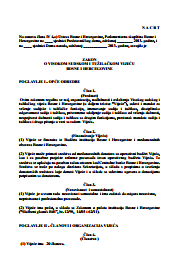
We kindly inform you that, as long as the subject affiliation of our 300.000+ articles is in progress, you might get unsufficient or no results on your third level or second level search. In this case, please broaden your search criteria.

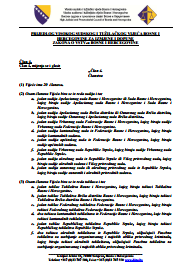
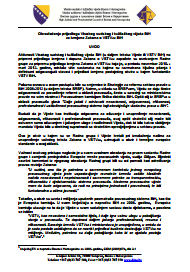
Aktivnosti Visokog sudskog i tužilačkog vijeća BiH (u daljem tekstu: Vijeće ili VSTV BiH) na pripremi prijedloga izmjena i dopuna Zakona o VSTV-u započete su osnivanjem Radne grupe za pripremu prijedloga izmjena Zakona o VSTV-u koja je, u periodu novembar 2010. - mart 2012. godine, održala više sastanaka na kojima su razmatrana ključna pitanja i definisani odgovarajući stavovi i prijedlozi izmjena postojećeg okvira u kojem funkcioniše VSTV BiH.
More...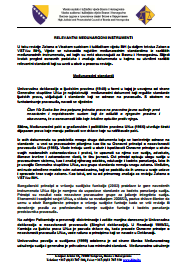
U toku revizije Zakona o Visokom sudskom i tužilačkom vijeću BiH (u daljem tekstu: Zakon o VSTV-u BiH), Vijeće se rukovodilo najvišim međunarodnim standardima iz različitih međunarodnih instrumenata, od kojih su neki obavezujući za Bosnu i Hercegovinu. Slijedi kratak pregled osnovnih podataka i značaja dokumenata u kojima su utvrđeni različiti relevantni standardi koji su uzeti u obzir u procesu revizije.
More...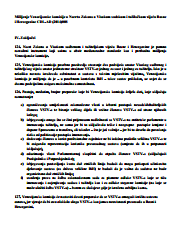
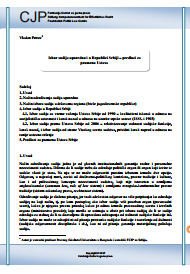
The adequate system of judicial appointments is one of the most important institutional guarantee of the real and personal independence of judiciary. In the first part of the article, the author briefly describes the main models of judicial appointments in comparative law. A lot of European states have introduced a special body (judicial council) with a competence to elect judges or to propose judicial candidates appointed by other organs (i. e. Parliament). However, there is no single non-political model of judicial appointments which could perfectly comply with the principle of the independence of judiciary, on the one hand, and the principle of the responsibility of judiciary, on the other. In the second part, the author analizes the most important features of the systems of judicial appointments in the states of the Region (the former Yugoslav republics). In all of them (except Slovenia), judicial councils elect judges. Those bodies consist of judicial and non-judical members. However, the judical element prevails. In almost all of them, there have been constitutional changes in the last few years whith a same goal to make a system of judicial appointments more objective. In the third part, the author, firstly, analizes the main characteristics of the system of judicial appointments under the Constitution of Serbia of 1990. The election of judges by the Parliament was the model with a lot of objections. The High Council of Judiciary was introduced in 2001 by the law not by the Constitution. The Constitution of Serbia of 2006 has made two important changes in the election of judiciary. Firstly, the Constitution has introduced the probationary period (three years) for a person who is elected a judge for the first time. Secondly, the Constitution constitutes The High Judicial Council as „an independent and autonomous body which shall provide for and guarantee independence and autonomy of courts and judges“. The author emphasizes the bad constitutional solutions from the inadequate definition of the principle of the separation of powers to the competences and the composition of the High Judicial Council.
More...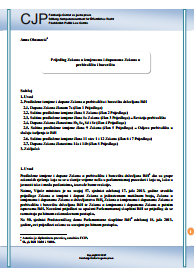
Razlozi za donošenje Zakona o izmjenama i dopunama Zakona o prebivalištu i boravištu državljana BiH, kako stoji u Obrazloženju uz Prijedlog, zasnivali su se na stvarnim potrebama proizašlim iz praktične primjene propisa vezanih za elektronski potpis, te u potrebi poboljšanja zakonskog teksta, preciziranjem uslova za prijavu i odjavu prebivališta i boravišta, u cilju sprečavanja zloupotreba ovog instituta. Izmjenama i dopunama Zakona o prebivalištu i boravištu inovira se način prijave i odjave prebivališta, tako što će bosanskohercegovački državljani moći prijaviti, odnosno odjaviti prebivalište ili boravište elektronskim putem kod nadležnih tijela, i to sigurnim elektronskim potpisom ovjerenim kvalificiranom potvrdom. Poteškoće će svakako pričinjavati činjenica da elektronski potpis još uvijek nije zaživio u praktičnoj primjeni. Prijedlogom Zakona se preciziraju uslovi za prijavu i odjavu prebivališta radi unapređenja sigurnosti osobnih dokumenata. Tako će bh. državljani prilikom prijave prebivališta morati priložiti zakonom određene dokaze da imaju valjan osnov za prebivalište na adresi na kojoj se prijavljuju. Upravo je ova dopuna Zakona izazvala brojne reakcije, posebno povratničke populacije čiji predstavnici smatraju da će ovakvim dopunama Zakona, povratak biti otežan te da one u svojoj suštini imaju za cilj brisanje širokog kruga građana BiH iz evidencije za koju se vezuju brojna druga prava, od kojih je najbitnije pravo glasa. Međutim, ovim izmjenama se prava na olakšane prijave prebivališta povratnika i raseljenih lica na njihova prijeratna mjesta stanovanja, nisu dirala. Dakle, odredbe o postupku olakšanog prijavljivanja prebivališta (na prijeratnoj adresi povratnika) ostaju i dalje na snazi, tako da uz adekvatnu primjenu Zakona lišenu bilo kakvih zloupotreba i pogrešnog tumačenja, povratnička prava u ovoj oblasti neće biti ugrožena. Također, utvrđuje se obaveza nadležnih organa da u roku od pet godina za svakog državljanina izvrše provjeru ispunjenosti uslova, za što će se koristiti digitalno popisani podaci iz evidencija organa nadležnih za vođenje evidencija. Predloženim izmjenama skraćen je period boravka u inozemstvu za koji se veže obaveza odjave prebivališta i prijave boravka sa jedne godine na tri mjeseca. Iz svega navedenog, nije najjasnije koji su bili stvarni razlozi zbog kojih su delegati u Domu naroda PS BiH smatrali potrebnim pokretanje postupka zaštite vitalnog nacionalnog interesa bošnjačkog naroda. Činjenica je da nisu bili ispunjeni uslovi razmatranja ovog Prijedloga zakona po hitnom postupku, ali to nije mogao biti razlog pokretanja postupka zaštite vitalnog nacionalnog interesa, što je Ustavni sud BiH svojom Odlukom36 i utvrdio. Nakon ovakve odluke Ustavnog suda BiH, a kako su delegati bošnjačkog naroda i najavili, ponovo je pokrenut mehanizam zaštite vitalnog nacionalnog interesa bošnjačkog naroda u odnosu na sadržaj Prijedloga. Razlog pokretanja, po njihovom mišljenju, leži u činjenici da bi rješenja sadržana u ovom Prijedlogu mogla rezultirati poništavanjem prebivališta povratnicima, koji su u najvećoj mjeri iz bošnjačkog naroda. Poteškoće u primjeni ovih novina bi se svakako javile jer još uvijek nisu doneseni potrebni podzakonski akti koji bi omogućili primjenu Zakona o elektronskom potpisu i time stvorili pretpostavke za primjenu i ovih predloženih izmjena Zakona o prebivalištu i boravištu. Ali, u slučaju pravilne primjene predloženog Zakona o izmjenama i dopunama Zakona o prebivalištu i boravištu, unaprijedio bi se sistem evidencija prebivališta i boravišta državljana BiH.
More...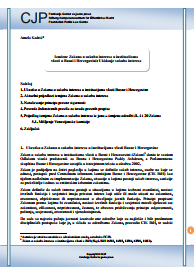
Analysis of the proposed amendments and the events that followed the submission of all proposals shows that there are very serious tendency for changes to the Law that favor the political elite and to insist on them regardless the fact that they violate proper procedures and rules. Changes of the most important provisions of the Law question the purpose and objective of the Law and the principles embodied in the Law. The adoption of the proposed amendments would provide additional arbitrariness of the political elites and the devastation of the state budget. Omitting the term "close relative" and changing the sanctions provided for offender of provisions of the Law would allow direct contracts with companies owned by close relatives of officials and heads of executive functions, and modifications of the Law on increase the cash value of the contract threshold, the huge amounts of state money would go into private safe of powerful politicians.
More...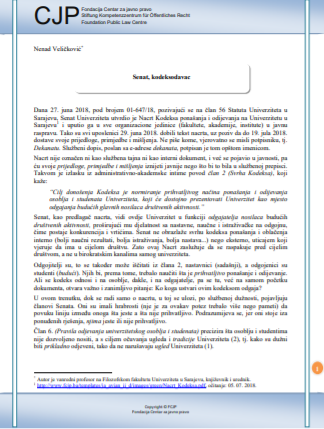
Dana 27. juna 2018, pod brojem 01-647/18, pozivajući se na član 56 Statuta Univerziteta u Sarajevu, Senat Univerziteta utvrdio je Nacrt Kodeksa ponašanja i odijevanja na Univerzitetu u Sarajevu i uputio ga u sve organizacione jedinice (fakultete, akademije, institute) u javnu raspravu. Tako su svi uposlenici 29. juna 2018. dobili tekst nacrta, uz poziv da do 19. jula 2018. dostave svoje prijedloge, primjedbe i mišljenja. Ne piše kome, vjerovatno se misli potpisniku, tj. Dekanatu. Službeni dopis, poslan sa e-adrese dekanata, potpisan je tom opštom imenicom.
More...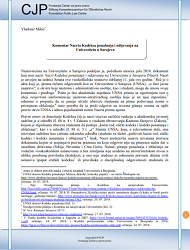
Nastavnicima na Univerzitetu u Sarajevu podeljen je, početkom meseca jula 2018. dokument koji nosi naziv Nacrt Kodeksa ponašanja i odijevanja na Univerzitetu u Sarajevu (Nacrt). Nacrt je usvojen na sednici Senata ove visokoškolske ustanove održanoj 11. jula ove godine. Reč je o aktu koji je, prema rečima odgovornih lica sa Univerziteta u Sarajevu (UNSA), „u fazi javne rasprave“, u okviru koje nastavno i administrativno osoblje, kao i studenti, mogu da iznesu svoje komentare i predloge. Pošto je deo akademske zajednice UNSA primio sa ogorčenjem vest o ideji svojevrsne uniformizacije nastavno-istraživačkog osoblja koje je na njoj zaposleno, odnosno o propustu da se jasnije utvrde obaveze studenata na planu poštovanja normi o pristojnom oblačenju, raste potreba da se pruži odgovor na izvesna pitanja vezana za opšti pravni okvir UNSA i odnos pojedinačnih normi Nacrta prema njemu.
More...
Mi smo grupa od 50 naučnika i stručnjaka za urbani razvoj i planiranje iz raznih delova sveta, koja je posetila Beograd povodom 24. godišnje konferencije naše Međunarodne mreže za urbano istraživanje i akciju (INURA). Imamo bogato iskustvo u radu na projektima razvoja priobalja u gradovima poput Londona, Amsterdama, Hamburga, Barselone, Bostona, Njujorka, Toronta, Vankuvera, Hong Konga, Sidneja i Melburna. Veoma smo impresionirani jedinstvenim kvalitetima Beograda, a posebno kompaktnošću i raznolikošću njegovih gradskih prostora. Veza grada sa vodom mogla bi se obogatiti pažljivim razvojem oblasti između centra i reke Save. Jasno nam je da je projekat “Beograd na vodi” inicijativa koja vodi upravo ka ostvarenju te veze i pozdravljamo tu težnju. Međutim, videli smo i proučili planove i osećamo potrebu da prenesemo našu ozbiljnu zabrinutost povodom samog predloga projekta.
More...
Da nije počela letnja šema, opet bi nam sve bilo nejasno; ovako je samo svejedno. Nokautiranana izmeničnim vrućinama i pljuskovima, optužbama za podle napade koje premijer ispaljuje u pauzama svečanih zaveta evropskim liderima da će biti dobar i pošten, javnost – ili ono što je od nje ostalo po opštoj evakuaciji na odmor – ostala je nezahvalno ravnodušna pred konačno otkrivenom maketom Beograda na vodi.
More...
Objavljivanje plana imunizacije, čak i ovakvog nepotpunog, odnosno nedovoljno detaljnog, pokazuje značaj transparentnosti. Bez objavljenog plana imunizacije, kada se pojavi vest da je vakcinisana grupa ljudi koji ranije nisu pominjani kao prioritet, u javnosti bi se mogla otvoriti debata da li su oni ipak izuzetno važni za funkcionisanje društva, ili treba da sačekaju dok se ne vakcinišu neke druge grupe. Kada imate plan i pojavi se, na primer, informacija da je prekoredno vakcinisana grupa tužilaca, takvo pitanje se ne postavlja. U planu nađete da je predviđena vakcinacija „zaposlenih u ustanovama koje su od značaja za funkcionisanje društva“ i onda možemo samo da debatujemo da li tužioci spadaju, unutar te grupe, među zaposlene u „službama/ustanovama od vitalnog značaja, sa povišenim rizikom od nastanka ili transmisije bolesti ili koji ne mogu da obezbede fizičku distancu“ ili spadaju u grupu „zaposleni u Ministarstvu unutrašnjih poslova i pravosuđu“.
More...
Početak primene tek odobrenih vakcina protiv korona virusa obeležen je odlaganjem, nestašicama i birokratskim greškama. Sve je jasnije da će mnogi zakazani rokovi za masovne vakcinacije biti probijeni. Provala optimizma koja prati odobrenje upotrebe novih vakcina – na talasu nerealnih očekivanja koje podstiču političari – sudara se sa realnošću izazova vakcinacije velikog dela svetskog stanovništva. Ogroman poduhvat farmaceutskih kompanija da proizvedu i spakuju doze već nailazi na probleme kao što je nestašica staklenih bočica.
More...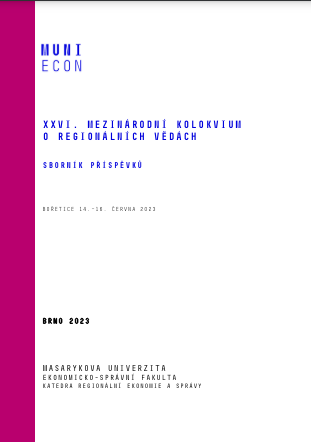
The topic of this paper is informal institutions (InIn) in community development, with a focus on rural communities. The trouble with InIn, however broadly their importance for the qualitative aspect of development is acknowledged, is that they are difficult to grasp. We therefore attempt to design and test a model that a) contributes to a more holistic consideration of these dimensions of community development and b) is realistically practicable in local development with local actors. We refer to this model as "integrated community development" ("ICD"). In designing the model, we are aware of the dynamic nature of InIn and the fundamental role of local actors. Therefore, the starting point is to identify together with them an expression for InIn that is understandable and engaging for them (as non-experts). The methodological framework is participatory action research. The main methods are in-depth interviews with locals and case studies of three municipalities following the process of validating interventions taking InIn into account. The main results are detailed findings on the operation of two of these elements: community platform and community coordinator, both in terms of site-specific solutions (situations) and in terms of contribution to generally applicable theories and practices.
More...
The development of the number of enterprises is of great importance for economic growth, job creation, resistance to crises or productivity growth. The aim of the article is prediction and a quantitative and qualitative analysis of the number of enterprises in Slovakia and its regions. In addition to general theoretical scientific methods, we used time analysis methods. We forecasted the number of enterprises using a linear trend. We monitored the intensity of differences in the development of the number of enterprises in the regions of Slovakia through the coefficient of variation. The main results show that the number of enterprises in Slovakia has been growing for a long time. The largest part is made up of small and medium-sized enterprises, while most of them are long-term concentrated in the capital and the surrounding area. The remaining regions have been lagging behind for a long time, and the dynamics of business growth does not reach the level necessary to mitigate regional disparities compared to the Bratislava self-governing region. The least favorable situation is in the Prešov self-governing region, where in the last ten years the number of micro-enterprises has grown, while the growth of medium-sized enterprises has been significantly slower.
More...
Along with the growth of the urban population, a sharp tendency of population aging in the cities has been observed. This raises the question of whether and how a city can become friendlier to vulnerable people. The natural environment has a major impact on the mobility and quality of life of the elderly, who must have good accessibility to urban green space. The aim of this research is the analysis of the access that vulnerable groups (children and elderly people) have to the urban green space and to the cultural ecosystem services it offers. Analyzing the demand and supply of urban green infrastructure among young and elderly people allows the assessment of social equity in terms of the cultural ecosystem services generated by urban green infrastructure. The analysis focused on the municipality of Râmnicu Vâlcea, because the present study is part of a larger work focused on the feasibility of creating a green belt around this municipality. The results show that with the decreasing trend of the young population and the increasing trend of the population over 65 years old, the two categories of population had at their disposal similar areas of green space in recent years. The area of green space related to the total population in the municipality of Râmnicu Vâlcea was in 2021 well below the minimum limit of 26 sqm/urban inhabitant and this means that the city needs more green space so that vulnerable people can benefit from the advantages offered by the urban green infrastructure. The present study contributes to the identification of areas where the concept of green infrastructure can be implemented in the form of green corridors, green wedges or green belts in Râmnicu Vâlcea municipality.
More...
Urban rivers have historically played crucial roles in the development of cities, serving as transportation routes, sources of water and centres of economic activity. However, rapid urbanization and industrialization have led to the degradation of these vital water bodies. This paper aims to explore the benefits of integrating urban rivers into the fabric of cities through comprehensive planning and effective management strategies. Drawing on a thorough review of pertinent literature and insightful case studies, we delve into the potential advantages of such integration, including ecological restoration, enhancement of water quality, provision of recreational opportunities, and fostering community revitalization.
More...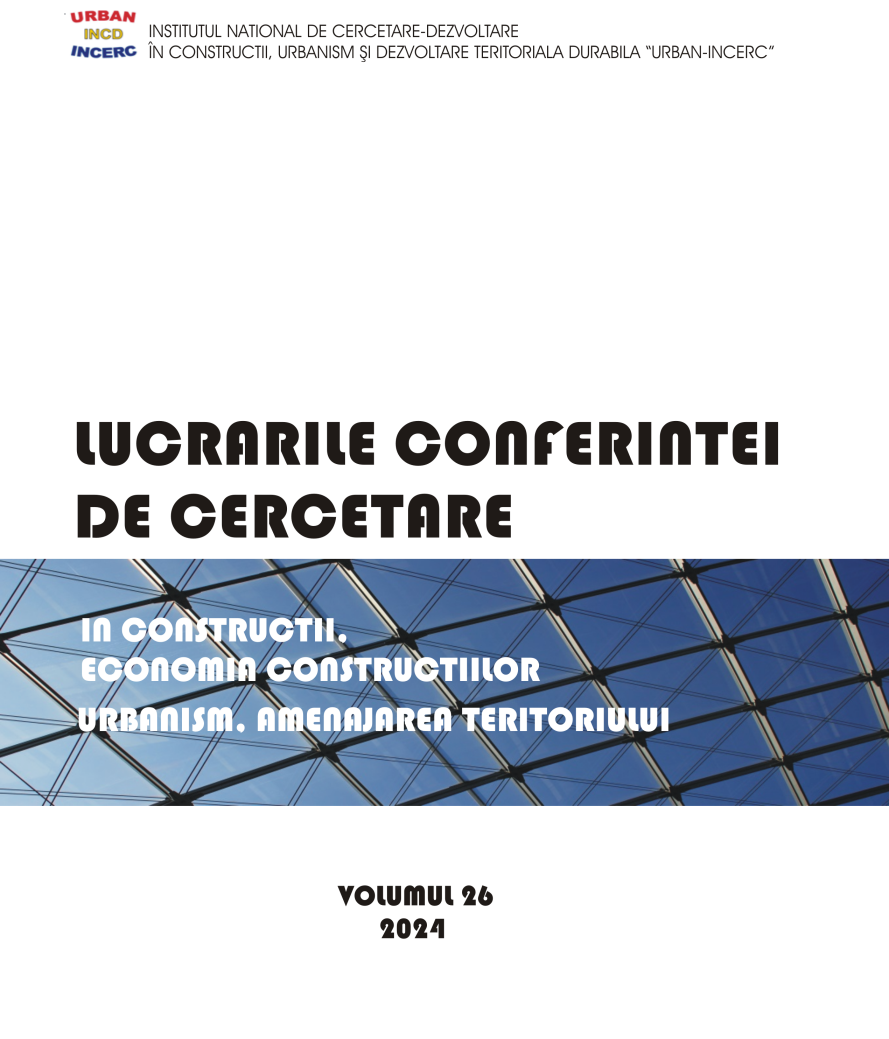
The purpose of this study is to bring forth the architect’s role in the conservation process of heritage buildings, following a more traditional path in an era of technologic evolution. It is fundamentally necessary to find conservation-compatible approaches and energy solutions that allow maintaining historical and aesthetic values, while lowering energy costs and minimizing environmental impact. Our study aims to identify methods and techniques for treating and optimizing built structures with historical and/or heritage value with an emphasis on the role of the architect. The paper illustrates how the most appropriate intervention can be achieved through processes that aim to achieve sustainable restoration/conservation. There are several green technologies that might be imbedded into historic buildings in unobtrusive or invisible ways. The restoration and consolidation of historical buildings represent a large and complex challenge requiring the involvement of several competent bodies from different fields, as well as the direct involvement of the community. Through theoretical analysis and by using appropriate methods of identification, evaluation and the choice of measures and techniques corresponding to each case of restoration and consolidation, a future of these structures built to carry forward the cultural heritage of a community or nation can be ensured.
More...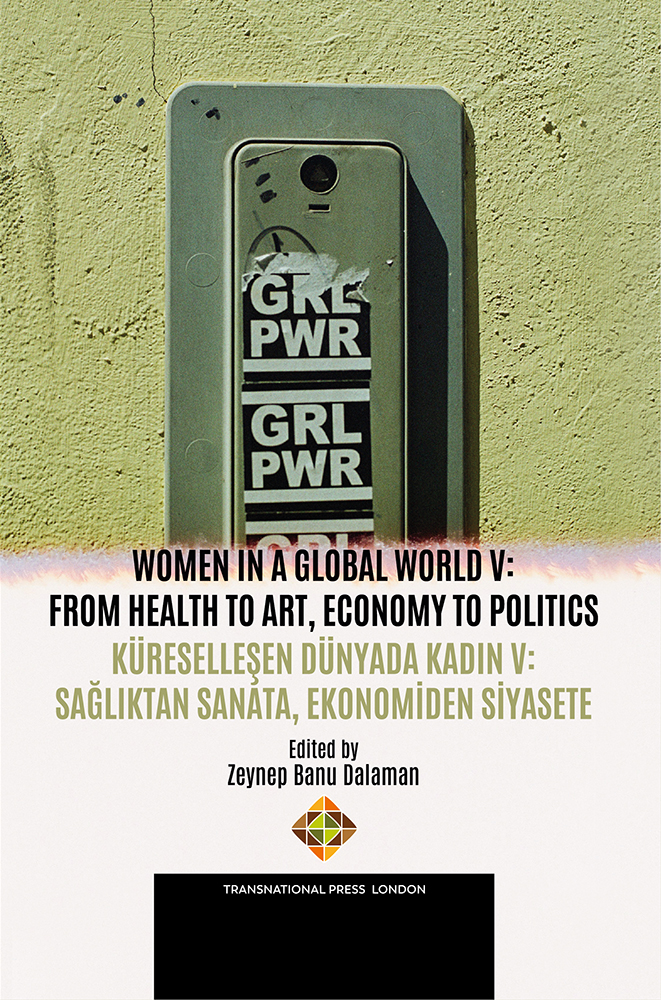
Family Planning is a strategy to help individuals manage the process of starting their own families and having children. The aim of family planning is to recognize the freedom of individuals to choose the time, number and spacing of their childbearing and to create a healthy society. Evidence-based practices in family planning methods provide a comprehensive assessment of the effectiveness, reliability and safety of family planning methods. Controlled clinical trials and meta-analyses of family planning practices provide evidence-based information on the effectiveness of these methods. Furthermore, the use of evidence-based approaches in family planning practices will ensure equality of access to health services in the community. In this context, this review was created by examining clinical guidelines, standards of care and evidence-based approaches to increase the effectiveness of family planning practices. This study aims to highlight the important contributions of evidence-based developments in family planning practices for health professionals, policy makers and the general public.
More...